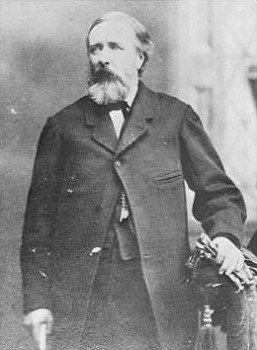William M. Browne facts for kids
Quick facts for kids
William M. Browne
|
|
|---|---|
 |
|
| Acting Confederate States Secretary of State | |
| In office February 18, 1862 – March 18, 1862 |
|
| President | Jefferson Davis |
| Preceded by | Robert Hunter |
| Succeeded by | Judah Benjamin |
| Personal details | |
| Born | July 7, 1823 County Mayo, Ireland, U.K. |
| Died | April 28, 1883 (aged 59) Athens, Georgia, U.S. |
| Resting place | Oconee Hill Cemetery Athens, Georgia, U.S. |
| Political party | Democratic |
| Spouse | Eliza Jane Beket |
| Military service | |
| Allegiance | |
| Branch/service | |
| Years of service | 1862–1865 |
| Rank | Colonel (CSA) |
| Commands | 1st Virginia Cavalry Battalion, Local Defense Browne's Local Brigade |
| Battles/wars | American Civil War |
William Montague Browne (born July 7, 1823 – died April 28, 1883) was an important politician and news writer during the American Civil War. He worked for the Confederacy. In 1862, he was the Acting Secretary of State. This job is like a country's main diplomat. He also served as a temporary brigadier general in the Confederate States Army. When the Confederate Senate did not approve his promotion, he went back to being a colonel.
Contents
Who Was William M. Browne?
William Montague Browne was born in County Mayo, Ireland, on July 7, 1823. Not much is known about his very early life. He moved to the United States in the 1850s.
Early Life and Career
By 1855, Browne was living in New York City. He worked as a writer for the New York Journal of Commerce newspaper. He was part of the Democratic Party. Later, he worked as a clerk in the House of Customs. In 1859, Browne moved to Washington D.C.. There, he wrote for a newspaper called the Washington Constitution. People sometimes called him Constitution Browne.
Role in the Civil War
In 1861, Browne was a strong supporter of states leaving the United States. This was called secession. He then moved to Athens, Georgia. He was a favorite of Jefferson Davis, who was the first President of the Confederacy. He was also liked by Robert Toombs, the Secretary of State.
Because of this, Browne was made Assistant Secretary of State. Several times in 1861 and 1862, he served as the temporary Secretary of State. He lived in Richmond, Virginia, with his wife, Eliza Jane Beket. They often had guests, including Howell Cobb. Cobb was a former U.S. Treasury Secretary and a close friend. His younger brother, Colonel Thomas R.R. Cobb, also stayed with them.
Helping the President
In March 1862, Browne left his job as Secretary of State. He became a military assistant, or aide-de-camp, to President Davis. He was given the rank of a Colonel in the cavalry. Besides helping the President, he also commanded a group of local defense cavalry soldiers.
On April 5, 1864, President Davis gave Browne another important job. He made him the Commandant of Conscription in Georgia. Conscription means forcing people to join the army. The governor of Georgia, Joseph E. Brown, often tried to stop the Confederate war efforts. Browne was a good choice for this job because he lived in Georgia. He had also studied and reported on conscription there before.
Leading Troops
In late 1864, Browne was still working on conscription. But he was also sent to lead a small group of reserve soldiers. This was during the Savannah Campaign. In December, Browne was promoted to a temporary brigadier general. This rank started on November 11, 1864.
He went back to his conscription duties in January 1865. However, in February 1865, the Confederate Senate did not approve his promotion. So, he went back to being a colonel. After the war, he was not allowed to receive amnesty right away. This was because he had been both a government official and a high-ranking military officer. He was later pardoned in 1865 or 1866.
After the War
After the war, Browne returned to Athens, Georgia. He studied law and became a lawyer in 1866. He also went back to working with newspapers. In 1868, he became the editor of the Southern Banner.
William Montague Browne was the great-great-uncle of Sir Robert Ricketts, 7th Baronet. Sir Robert Ricketts lived in Gloucestershire, England.
See also
Images for kids
 | Victor J. Glover |
 | Yvonne Cagle |
 | Jeanette Epps |
 | Bernard A. Harris Jr. |


